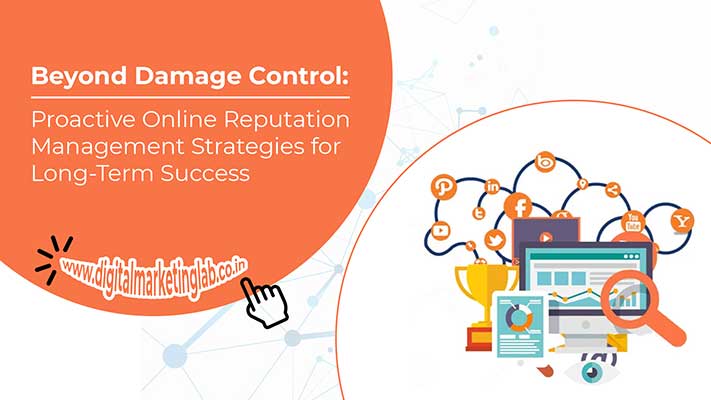Beyond Damage Control: Proactive Online Reputation Management Strategies for Long-Term Success
Online reputation management (ORM) is not just about reacting to negative feedback; it is about taking a proactive approach to shape public perception and ensure long-term business success. By implementing proactive ORM strategies, businesses can establish a positive online presence, build credibility, and enhance brand reputation. In this blog, we will explore the importance of proactive online reputation management and provide strategies for maintaining a strong reputation in the digital landscape.
The Need for Proactive Online Reputation Management: In today's interconnected world, businesses are constantly under scrutiny, and a single negative incident can have a lasting impact on their reputation. Proactive online reputation management involves actively monitoring and influencing how your brand is perceived online, even when there are no immediate issues. By taking a proactive stance, businesses can effectively manage potential risks, capitalize on opportunities, and ensure a positive brand image that resonates with their target audience.
Building a Strong Online Presence: A key aspect of proactive ORM is building a strong online presence. This includes creating a professional and user-friendly website, optimizing it for search engines, and regularly updating content. Invest in search engine optimization (SEO) techniques to ensure your website ranks high in search results, driving organic traffic and enhancing brand visibility. Establish a consistent brand voice across all online platforms, including social media, blogs, and industry forums, to reinforce your brand identity and values.
Monitoring Online Mentions and Sentiment: To be proactive in managing your online reputation, it is essential to monitor online mentions and sentiment about your brand. Utilize social media listening tools and online monitoring services to track brand mentions, customer feedback, and industry trends. Analyze the sentiment behind these mentions to understand how your brand is perceived by the audience. By staying informed about online conversations related to your brand, you can quickly address any potential issues and proactively engage with your audience.
Leveraging Content Marketing: Content marketing plays a vital role in proactive online reputation management. Develop a content strategy that focuses on providing valuable and relevant information to your target audience. Create high-quality blog posts, articles, videos, and infographics that showcase your expertise and address common customer queries. By consistently publishing valuable content, you can position yourself as a trusted authority in your industry, enhance your brand reputation, and attract a loyal following.
Engaging with Your Audience: Proactive ORM involves actively engaging with your audience across various online platforms. Respond promptly to customer inquiries, feedback, and reviews. Encourage positive customer interactions by providing exceptional customer service and personalized experiences. Actively participate in industry-related discussions and address any misconceptions or negative perceptions about your brand. By being accessible and responsive, you can build trust and foster a positive online reputation.
Establishing Thought Leadership: Establishing thought leadership in your industry is an effective way to proactively manage your online reputation. Share your expertise through guest blogging, speaking engagements, and participation in industry conferences and webinars. Collaborate with influencers and industry experts to amplify your reach and credibility. By positioning yourself as a thought leader, you not only enhance your brand reputation but also gain the trust and respect of your audience.
Online Review Management: Proactive ORM includes actively managing online reviews. Encourage satisfied customers to leave positive reviews on relevant platforms. Monitor online review sites to address negative feedback promptly and offer solutions. Engage with reviewers in a professional and empathetic manner to resolve any issues and showcase your commitment to customer satisfaction. By actively managing online reviews, you can shape public perception and build a positive online reputation.
Summary
Proactive online reputation management involves building a strong online presence, monitoring mentions, leveraging content marketing, engaging with the audience, and actively managing reviews.

